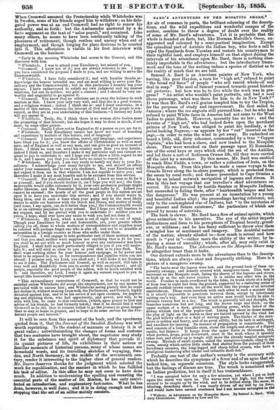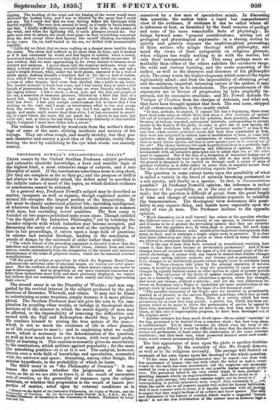HARD'S AD VENTURES ON THE MOSQUITO SHORE..
AN air of romance in parts, the brilliant colouring of the descrip- tions, and the wild expeditions and wonderful escapes of the author, combine to throw a degree of doubt over the reality of some of Mr. Bard's adventures. Yet it is probable that the whole is founded on facts, but, like Herman Melville's Omoo, ex- aggerated and coloured by a semi-poetical imagination. Except the episodical part of Antonio the Indian boy, who feels a call to expel the Spaniards from Yucatan and restore his countrymen to their rightful land, and employs himself on that object during the intervals of his attendance upon Mr. Bard, there is nothing abso- lutely improbable in the adventures; but the introductory frame- work and the tone of the writing induce a species of distrust as to the reality of much that we are told.
Samuel A. Bard is an American painter of New York, who having, like poor Hayden, a turn for " high art," refused to paint "the broad red faces" of people " who sell rancid whale-oil and deal in soap." The soul of Samuel Teamed towards grand histori- cal pictures ; but how was he to live while the work was in pro- gress? " An artist who wouldn't paint portraits, and had a soul above patronage, what was there for him to do in New York ?" It was then Mr. Bard's evil genius tempted him to try the Tropics, for the purposes of study and improvement. He first sailed to Jamaica ; where the res angnsta still pursued him ; but he who had refused to paint White faces in America had not come to the West Indies to paint Black. However, necessity has no law ; and the devotee of " high art," who had looked down upon the merchant princes of New York, was obliged to paint his landlady, a fat jovial-looking Negress,—as appears by her "cut" inserted on the page,—in order to raise the wind to get away. He embarked on board a little, old, dirty schooner, commanded by a true " Copper Captain," who had been a slave, and now traded to the Mosquito shore. They were wrecked on their passage upon El Roncador, one of the coral keys or clays which stud the sea of the Antilles, and led there a sort of Robinson Crusoe life, till they were carried off the islet by a wrecker. By this means, Mr. Bard was enabled to reach Blue Fields, a town, or rather a collection of huts, on the Mosquito shore. From this place he made a canoe voyage to the Grande River along the in-shore passage, which is protected from the oeean by coral reefs ; and thence proceeded to Cape Grams a Dios by an inland network navigation of lagoons and rivers. It was in this last voyage that our traveller's chief adventures oc- curred. He was pursued• by hostile Sambos or Mosquito Indians, but succeeded in foiling them, after " hairbreadth 'scapes and bat- ties dangerous." He was present at an incantation by a young and beautiful Indian sibyl ; the proceedings having reference, not only to the contemplated rise of Indians, but " to the mysteries of our present and future existence," the particulars of which are passed by means of asterisks.
The book is clever. Mr. Bard has a flow of animal spirits, which gives animation to his narrative. The eye of the artist imparts distinctness and force to his perceptions of Tropical beauty, grand- eur, or wildness ; and he has fancy sufficient to throw over them a mingled hue of sentiment and imagery. The doubtful nature of the matter, already alluded to—how much is actual and how much is "put in "—rather mars the ability of the writer, by in- ducing a sense of unreality ; whieb, after all, may only exist in Mr. Bard's manner. The Adventures on the _Mosquito Shore may be altogether truer than it looks.
Our distrust extends more to the adventures than to the descrip- tions, which are always clear and frequently striking. Here is a picture of a mangrove swamp.
"The banks near the lagoon were low, and the ground back of them ap- parently swampy, and densely covered with mangrove-trees. This tree is
universal on the Mosquito coast, lining the shores of the lagoons and rivers, as high up as the salt water reaches. It is unlike any other tree in the world. Peculiar to lands overflowed by the tides, its trunk starts at a height of from four to eight feet from the ground, supported by a radiating series of smooth reddish-brown roots, for all the world like the prongs of an inverted candelabrum. Them roots interlock with each other in such a manner that it is utterly impossible to penetrate between them, except by laboriously
cutting one's way. And even then an active man would hardly be able to advance twenty feet in a day. The trunk is generally tall and straight, the
branches numerous but not long, and the leaves large and thick ; on the upper surface of a dark, glistening, unfading green, while below of the downy whitish tint of the poplar-leaf. Lining the shore in dense masses, the play of light on the leaves as they are turned upward by the wind has the glad billowy effect of a field of waving grain. The timber of the man- grove is sodden and heavy, and of no great utility, but its bark is astringent, and excellent for tanning. Its manner of propagation is remarkable. The seed consists of a long beanlike stem, about the length and shape of a dipped candle, but thinner. It hangs from the upper limbs in thousands, and, when perfect, drops, point downward, erect in the mud, where it speedily takes root, and shoots up to tangle still more the already tangled mangrove swamp. Myriads of small oysters, called the mangrove-oysters, cling to the roots, among which active little crabs find shelter from the pursuit of their hereditary enemies, the long-legged and sharp-billed cranes, who have a prodigious hankering after tender and infantile shell-fish."
Probably one test of the author's veracity is the accuracy with which he describes the symptoms of a fever and of an ague that at- tacked him, on separate occasions. The style looks exaggerated, but the feelings of disease are true. The wreck is associated with an Indian prediction, but in itself it has vraisemblance.
"I was occupied below for only a few minutes, yet when I got on deck again the storm was upon us. The waves were not high, but the water seemed to be caught up by the wind, and to be drifted along, like snow, in blinding, drenching sheets. I was nearly driven off my feet by its force, and would have been carried overboard had I not become entangled in the
• Wailum; Cr Adventures on the Mosquito Shore. By Samuel A. Bard. With sixty Illustrations. Published by Low and Co.
'rigging. The howling of the wind and the hissing of the water would have drowned the loudest voice, and I was so blinded by the spray that I could not see. Yet I could feel that we were driving before the hurricane with fearful rapidity. The very deck seemed to bend, as if ready to break beneath our feet. I finally sufficiently recovered myself to be able, in the pauses of the wind, and when the lightning fell, to catch glimpses around me. Our sails were torn in tatters, the yards were gone—in fact, everything was swept from the deck except three dark figures, like myself clinging convulsively to the ropes. On, on, half-buried in the sea, we drifted with inconceivable rapidity. "Little did we think that we were rushing on a danger more terrible than the ocean. The storm had buffeted us for more than an hour, and it seemed as if it had exhausted its wrath and had begun to subside, when a sound, hoarse and steady, but louder even than that of the wind, broke on our ears. It was evident that we were approaching it, for every instant it became more distinct and ominous. I gazed ahead into the hopeless darkness, when sud- denly a broad sheet of lightning revealed immediately before us, and not a cable's length distant, what, under the lurid gleam, appeared to be a wall of white spray, dashing literally a hundred feet in the air—a hell of waters, from which there was no escape. " El Roncador ! " shrieked the captain, in a voice of utter despair, that even then thrilled like a knife in my heart. The fearful moment of death had come, and I had barely time to draw a full breath of preparation for the struggle, when we were literally whelmed in the raging waters. I felt a shock, a sharp jerk, and the hiss and gurgle of the sea, a sensation of immense pressure, followed by a blow like that of a heavy fall. Again I was lifted up, and again struck down, but this time with less force. I bad just enough consciousness left to know that I was striking on the sand, and I made an involuntary effort to rise and escape from the waves. Before I could gain my feet I was again struck down, again, and again, until, nearer dead than alive, I at last succeeded in crawl- ing to a spot where the water did not reach me. I strove to rise now, but could not ; and, as that is the last thing I remember distinctly of that terrible night, I suppose I must have fallen into a swoon."
The volume is illustrated by wood-cuts from the author's draw- ings of some of the more striking incidents and scenery of his voyage. They are often rough, and mostly sketchy, but they i pos- sess character and convey a good idea of the subjects, really llus- trating the text by exhibiting to the eye what words can scarcely convey.



























 Previous page
Previous page